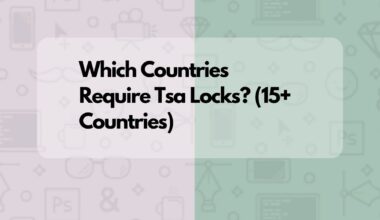As an Amazon Associate, I earn a small commission from qualifying purchases. Learn more about this.
It was during my trip to Berlin when I first encountered the question.
A fellow traveler and I were discussing how we manage our daily lives, and the topic of ADHD medications came up. ‘Is something like Vyvanse legal here in Europe?’ he pondered. I realized then that it was something worth exploring with the Strangermiles community, and here I am, sharing with you what I’ve discovered.
Hey, I’m Ebubechukwu Isaiah, and in today’s article, I’ll be going over Europe’s stand on Vyvanse.
Is Vyvanse Legal in Europe?
First things first, let’s talk about what Vyvanse actually is.
Known to scientists as lisdexamfetamine, it’s a medication primarily used to treat ADHD (Attention Deficit Hyperactivity Disorder) and binge eating disorders.
In the U.S., it’s fairly common and is prescribed to both youngsters and adults. But when it comes to Europe, the situation gets a bit, well, complicated.
Europe isn’t a monolith, and that’s the key here. Different countries, different rules. So, there’s no single “yes” or “no” answer. In some countries within the European Union, Vyvanse is recognized and permitted as a prescription medication, but under a different name.
For instance, did you know that in the UK, they call it Elvanse? Yep, same drug, different name. But, it’s strictly regulated, meaning you need a specialist’s prescription to get your hands on it.
However, let’s hop over to a country like Germany. They’re a bit stricter.
As of my journey, Germany hasn’t approved Vyvanse at all. If you’re moving there or just visiting, this is the kind of information you need to know! It’s not just about legality; it’s also about availability.
You see, even if a medication is legal in a country, it doesn’t mean it’s widely available. Some countries have approved it, but it’s not yet in the market, which can be just as tricky as it being outright illegal.
European Countries where Vyvanse is somewhat legal
| Country | Legal Status | Brand Name | Notes |
|---|---|---|---|
| United Kingdom | Legal | Elvanse | Available under prescription for ADHD. Strict guidelines for prescription. |
| Sweden | Legal | Elvanse | Used for ADHD; prescription and distribution are closely monitored. |
| Denmark | Legal | Elvanse | Prescribed primarily for ADHD after a detailed medical assessment. |
| Norway | Legal | Elvanse | Available under strict prescription guidelines for ADHD. |
| Iceland | Legal | Elvanse | Used under controlled guidelines for treating ADHD. |
| Finland | Legal | Elvanse | Available for ADHD treatment, but with strict prescription control. |
| Ireland | Legal | Elvanse | Prescribed for ADHD; strict regulations apply. |
| Portugal | Legal | Venvanse | Available under prescription, primarily for ADHD treatment. |
European Countries where Vyvanse is somewhat Illegal or Unavailable
| Country | Status | Reason/Notes |
|---|---|---|
| Germany | Not Approved | Vyvanse is not approved for medical use, and therefore not available in the market. |
| France | Not Approved | The medication has not received approval and is not available for prescriptions. |
| Italy | Not Approved | Vyvanse has not been approved by health authorities for use in Italy. |
| Spain | Not Approved | It’s not on the market, as it hasn’t been approved by the relevant health authorities. |
| Austria | Not Approved | The drug is not approved for use and is therefore not available in pharmacies. |
| Switzerland | Not Approved | Vyvanse is not in the Swiss market due to lack of approval from health authorities. |
| Belgium | Not Approved | The medication has not been approved for use and is not available. |
| Netherlands | Not Approved | Lack of approval from health authorities means it’s not available in the market. |
| Poland | Not Approved | Vyvanse has not received approval for use in Poland. |
| Greece | Not Approved | The medication is not available, as it hasn’t been approved by health authorities. |
Can you bring Vyvanse into a country where it’s not available or approved?
“Not available” doesn’t always mean “illegal.”
However, it does mean the country’s health authorities haven’t given the green light for the medication to be marketed or prescribed.
Now, bringing in a drug that’s not approved in the country can be like trying to walk through a wall — there are rules, and they’re usually strict.
Most countries have a stern stance on bringing medications across borders, especially prescription drugs classified as stimulants.
Yes, Vyvanse falls into this category. You’re not just dealing with the challenge of it being unapproved; there are also controlled substance laws at play. These laws aren’t just print on paper; they can have real consequences if not followed to the letter.
So, what’s a traveler to do?
Research, research, and more research.
Check the embassy’s website of the country you’re visiting, or give them a call. They can provide the most reliable information on what’s allowed and what’s not. Also, consider reaching out to the country’s medication regulatory agency for detailed guidance.
If you’re staying abroad for an extended period, another route could be discussing your medication needs with a local doctor or specialist, once you’re there.
They’re tuned into the local legal symphony and can guide on alternative treatments that harmonize with the country’s regulations.
Here’s the bottom line: don’t wing it.
Rules about medication importation vary widely and can change. You don’t want to find yourself in a legal snarl in a foreign country over a misunderstanding.
Verify everything beforehand, and when in doubt, seek professional advice. It might take some extra legwork, but your peace of mind? Worth it.
What’s the best Alternative to Vyvanse in Europe?
Let’s say you’re in a European country where Vyvanse is a no-go. Now what? Well, you don’t have to feel like a ship without a sail; there are alternatives, my friends.
Keep in mind here that the goal here isn’t to replace one brand with another but to find viable treatment options that are both legal and accessible in Europe.
1. Concerta
One standout is Concerta (also known as methylphenidate). It’s a name that pops up quite frequently in discussions with European doctors when Vyvanse is off the table.
Approved and available in several countries across Europe, Concerta is also used to treat ADHD. It works differently from Vyvanse but serves a similar purpose: helping to increase attention and decrease impulsiveness and hyperactivity in patients with ADHD.
2. Strattera
Then there’s Strattera (atomoxetine), another alternative that’s gained ground in Europe.
Unlike Vyvanse and Concerta, Strattera isn’t a stimulant, which means it takes a different approach to treat ADHD symptoms.
It’s known for having a slower onset of effects, but it’s a favorite for those who haven’t had much luck with stimulant medications or can’t use them due to certain health reasons.
But here’s the golden nugget of wisdom: the “best” alternative isn’t a one-size-fits-all. Bodies react differently, and what works wonders for one person might not for another.
This is why it’s crucial to have a candid conversation with a healthcare provider, especially when you’re miles away from home. They’ll consider your medical history, response to treatments, potential side effects, and the local laws before scribbling down any prescription.
So, while the waters may seem murky when Vyvanse is out of reach, know there are other ships in the sea. It’s all about finding the one that’s right for you, even when you’re dancing to the rhythm of a different drum in Europe!
Conclusion
During my travels, I engaged with many individuals about their experiences.
In Amsterdam, a student shared that she had to switch medications when she moved from the US, as her prescription for Vyvanse was not refillable in the Netherlands.
Conversely, a professional in London mentioned he regularly received his Vyvanse (Elvanse) prescription without much hassle, albeit under a different name.
The whole thing is a complex tapestry of regulations, healthcare systems, and societal norms. What’s consistent, though, is the necessity for awareness and understanding, especially for travelers or those moving abroad.







